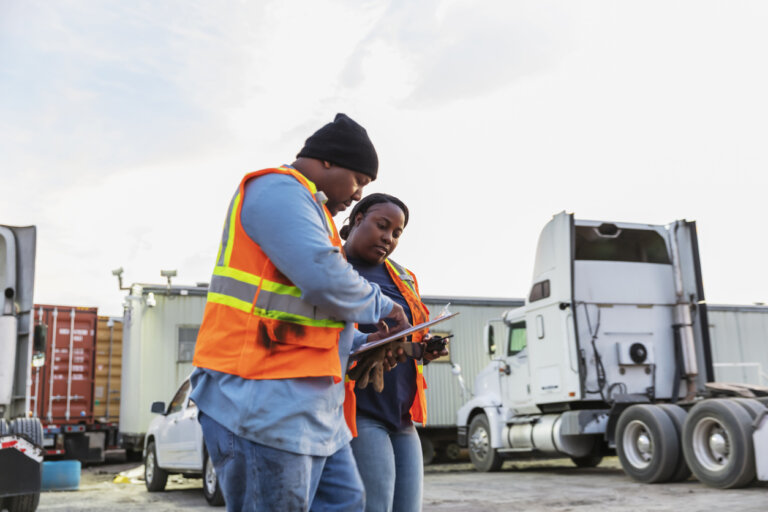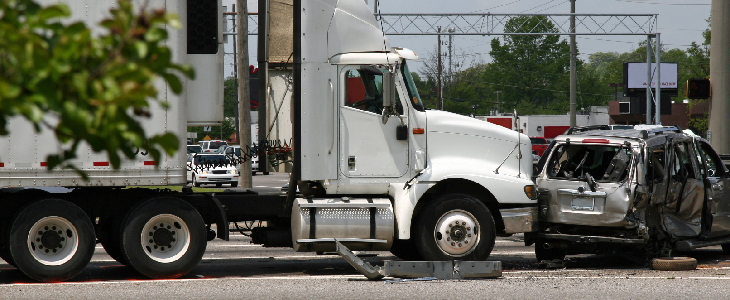Understanding Insurance in Truck Accidents
Truck accidents often involve more than one insurance policy. In many cases, there’s the truck driver’s policy, the trucking company’s policy, and possibly even third-party coverage, depending on the vehicle’s cargo or maintenance providers. Unlike a typical car crash, the insurance situation here can get complicated fast.
Federal regulations require commercial trucks to carry higher liability limits than passenger vehicles. That’s good news in terms of potential compensation, but it also means the insurance companies have more at stake—and more incentive to push back. This is significant because each policyholder (the driver, the company, etc.) may have their own adjusters and legal teams. They may point fingers at each other or even blame you. All of this affects how quickly, or even whether, your claim gets paid.
Understanding how these policies interact is key to holding the right parties accountable. That’s something we look at early on in your case so we know exactly where to focus our energy when it’s time to deal with the insurance companies.
Immediate Actions After a Truck Accident
What you do in the moments after a truck accident can shape your entire insurance claim. These early steps matter—not just for your health but for your ability to recover fair compensation later.
1. Start with safety
Call 911 right away. Even if no one seems seriously hurt, getting emergency responders to the scene is critical. They’ll document the accident, assist anyone who needs medical care, and file an official police report that can become a key piece of evidence.
2. If it’s safe to do so, gather information at the scene:
- Take photos of the vehicles, the damage, and the surrounding area
- Snap pictures of skid marks, road signs, and weather conditions
- Get the truck driver’s license, insurance, and employer details
- Collect names and phone numbers of any witnesses
3. Seek medical attention
Some injuries—like whiplash, internal trauma, or concussions—may not be apparent right away. Getting checked out by a doctor helps protect your health and creates a medical record that links your injuries to the crash.
4. When you report the accident to your insurance company, keep it brief. Stick to the facts:
- The date, time, and location of the crash
- That you were involved and are seeking treatment
- That an official police report was filed
The trucking company’s insurance team may already be working to limit its liability. The sooner we get involved, the sooner we can start protecting your rights and making sure key evidence is preserved.

Dealing with Insurance Companies
Once a claim is filed, the insurance companies will begin their investigations. This includes reviewing the accident report, speaking with their policyholder, and often reaching out to you for a statement.
You might think, “I’ve got nothing to hide—why not talk to them?” The problem is that they’re trained to look for ways to limit your claim. That’s true whether it’s the trucker’s insurance or your own. Insurance adjusters may act friendly, but their questions are designed to lock you into a version of events that helps them pay less. They may ask about pre-existing conditions, suggest you were partially at fault, or argue that your injuries aren’t related to the accident.
Our team at Ardalan & Associates can step in to handle all communication with the insurance companies. That way, nothing you say gets twisted or used against you. Our goal is to make sure you’re treated fairly, and that starts with controlling the conversation.
Common Tactics Used by Insurance Adjusters
Insurance adjusters use a range of strategies to reduce or deny claims. Here are a few common ones:
- Offering a quick, low settlement: It might seem helpful, but it’s often far less than what your case is worth.
- Delaying responses: They hope you’ll get frustrated or desperate enough to accept a lower offer.
- Requesting unnecessary documents: This can create confusion or cause delays that work against you.
- Disputing the severity of your injuries: They may claim your injuries are from a prior condition or aren’t supported by medical records.
They may even send you to a doctor of their choosing for an “independent” medical evaluation. These evaluations often support the insurer, not you.
How to Recognize and Respond to Minimization Strategies
When insurance companies try to minimize your injuries or losses, it often starts with language. They might say, “Your injuries appear to be minor,” or “You didn’t need much treatment.” They may also mischaracterize your statements or selectively quote from your medical records. This is why we advise clients not to give recorded statements or sign medical releases without legal guidance.
We are familiar with these strategies. When we represent you, we call them out early and back your claim with solid evidence—medical records, expert evaluations, and crash data. That way, your story stays front and center.
The Role of Truck Accident Attorneys
Our role goes far beyond filing paperwork. When you’re up against powerful insurance companies, you need someone on your side who understands how these companies operate. We investigate the accident, gather key evidence (like black box data and driver logs), and identify all potential sources of compensation.
We also handle all communications with insurance adjusters, coordinate with your doctors, and help document your losses. That includes medical bills, lost wages, pain and suffering, and any long-term effects of your injuries.

Navigating the Claims Process
Filing an insurance claim after a truck accident isn’t as simple as submitting a few forms. First, there’s the issue of determining fault. Truck accidents often involve commercial policies, and these carriers typically launch aggressive investigations to protect their bottom line.
Then comes the negotiation phase. Insurance companies rarely make their best offer upfront. They may try to divide and conquer—blaming another insurer or arguing over policy coverage. That’s especially common when multiple parties are involved.
We handle all aspects of the claims process for our clients, including:
- Identifying all liable parties
- Communicating with multiple insurance carriers
- Coordinating medical treatment and documentation
- Building a strong claim supported by evidence
- Negotiating for full and fair compensation
If negotiations fail, we’re ready to pursue the case in court. Having a trial-ready team shows the insurance companies we’re serious—and that can change the tone of negotiations in your favor.
Key Factors That Impact the Value of Your Claim
Not all truck accident claims are valued the same. Insurance companies look at several key factors when deciding how much they’re willing to pay. Understanding what goes into this calculation can help you see why some claims result in higher compensation, and why yours might be worth more than you think.
Here are some of the most important elements that can affect the value of your claim:
- Severity of injuries: More serious or long-term injuries often lead to larger settlements. That includes traumatic brain injuries, spinal damage, and multiple fractures.
- Medical expenses: Bills from emergency care, surgeries, hospital stays, and follow-up treatments all play a major role.
- Lost wages and earning capacity: If your injuries kept you from working, or will impact your ability to earn in the future, that loss is compensable.
- Pain and suffering: Physical discomfort, emotional distress, and changes to your daily life are also considered.
- Property damage: The cost to repair or replace your vehicle and other personal items can be factored in.
- Fault and liability: If the trucking company’s fault is clear, that strengthens your case. But if there’s a dispute over who caused the crash, the value can drop.
- Insurance policy limits: Sometimes, the amount you can recover is limited by the available coverage, especially if multiple claims are involved.
We carefully evaluate all of these factors when building your claim. By fully documenting your losses and presenting strong evidence, we help ensure the insurance company sees the full impact the accident has had on your life.
Calculating Fair Compensation
When you’re dealing with the aftermath of a truck accident, it’s easy to feel uncertain about what your claim is actually worth. Insurance companies often take advantage of this by offering low settlements. That’s why it’s important to understand how fair compensation is calculated—and why you shouldn’t rely on the insurer to define what’s “fair.”
We look at both economic and non-economic damages to get a complete picture of what you’ve lost.
Economic damages include:
- Medical bills (past, current, and future)
- Physical therapy and rehabilitation
- Prescription medications and medical equipment
- Lost wages and reduced earning potential
- Vehicle repair or replacement
Non-economic damages cover more personal impacts, such as:
- Pain and suffering
- Emotional distress
- Loss of enjoyment of life
- Disfigurement or permanent disability
We often work with medical professionals, vocational experts, and financial analysts to estimate long-term costs, especially if your injuries will require ongoing treatment or prevent you from returning to your job.
Calculating a fair settlement isn’t just about adding up receipts—it’s about understanding how the accident has affected every part of your life. We take the time to build a detailed claim that reflects your full experience, so you’re not left covering the cost of someone else’s negligence.

Challenges in Insurance Negotiations
Negotiating with insurance companies can be frustrating. Some of the biggest challenges include:
- Disputes over liability: Each party tries to shift blame to avoid paying.
- Policy exclusions: Insurers may argue that the policy doesn’t apply due to fine print.
- Undervaluing damages: This includes questioning your medical treatment or future care needs.
- Bad faith tactics: In some cases, an insurer might act unreasonably or dishonestly.
We’re familiar with these roadblocks, and we don’t let them slide. When insurers cross the line into bad faith, we’re prepared to take legal action to hold them accountable.
Why Hiring a Truck Accident Attorney is Critical
You might wonder if you can handle the claim yourself. For more minor accidents, you may be able to. But when a commercial truck is involved, the stakes are higher. The injuries tend to be more serious, and the legal and insurance issues are more complex. Without legal help, it’s easy to accept a low settlement or miss out on compensation you didn’t know you were entitled to. You may not know how to calculate future medical costs or prove lost earning capacity, but we can help.
Our job is to level the playing field. We take on the insurance companies with confidence and experience. We understand the laws that apply to commercial trucking and use that knowledge to build a strong case on your behalf. Hiring a truck accident attorney is about being prepared. When you work with us, you’ll have a team that’s ready to fight for what you deserve.
Contact the Thousand Oaks Personal Injury Attorneys at Ardalan & Associates
If you’ve been injured in a truck accident, you don’t have to go it alone. At Ardalan & Associates, we help individuals and families throughout Thousand Oaks and the surrounding areas hold insurance companies accountable. We’ve seen firsthand how insurance companies try to underpay or deny valid claims, and we push back.
Let us take the weight off your shoulders. From investigating the accident to negotiating with insurers, we’ll guide you every step of the way. Call us today for a free consultation. Your recovery is our priority, and your rights matter.
Ardalan & Associates, PLC is a personal injury law firm based in Thousand Oaks, also serving all of Southern California, including Los Angeles, Ventura, Kern, and Orange County. We are committed to helping clients involved in personal injury accidents seek justice and navigate their legal journey.
